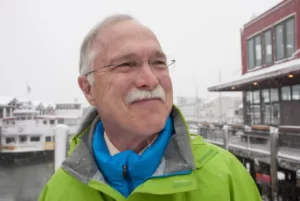It is a difficult truth, but at 31 years of age, Maria is slowly, inexorably dying.
Reflections
On the way back to the city, I reflect on Maria. Although it is 2007, I feel like I have been transported back to my first year in practice in 1985, to the many failures of treatment our patients suffered through. Older rheumatologists can still remember when we relied on gold, capable of placing a few patients in remission, but fraught with side effects and ineffective for the majority. Methotrexate was utilized, but often cautiously, and in relatively low doses.
At my weekly rheumatology conference at Maine Medical Center, Phil Thompson MD, 20 years my senior, recalled hospitalizing patients with rheumatoid arthritis with complications of the disease we rarely see today: vasculitis, pleuro-pericardial effusions, secondary amyloidosis and infections from high-dose corticosteroid treatment. Despite his best efforts, these patients frequently died.
I remember my grandfather, Rice Beavers, afflicted for the last seven years of his life by a combination of rheumatoid arthritis and Parkinson’s disease in rural West Virginia in the early 1970s. Once a vibrant blacksmith and farmer, year by year he was beaten down to a state of helplessness and dependency. A hired man lifted him from bed each day into his wheelchair, dressed him, bathed him and strapped a spoon to his hand so he could feed himself. Two years before he died, he was bedbound and no longer able to feed himself.
From time to time, I consult on old-time patients with rheumatoid arthritis in my practice in northeast Maine—patients whose disease has inexorably progressed without a trial of an aggressive disease-modifying anti-rheumatic drug or biologic.
Just four months ago, I received a phone call about a family fleeing the war in their native Ukraine with their 5-year-old daughter, who had previously been diagnosed with juvenile idiopathic arthritis. They arrived in Maine with nothing but the clothes they could carry. The girl was beginning to flare. I called Ed Fels, a pediatric rheumatologist, who cut through the red tape and promptly arranged for her to restart adalimumab. But what if they had landed in a refugee settlement? What if adalimumab were simply unavailable?
It is in these moments that I remember Maria, the burden of disease she carried and the loving care she received from her family and healthcare workers.
We should never take for granted the immense progress basic science, clinical trials and the availability of effective treatment has made in our patients’ lives. There were once many Marias, but there are far fewer today, and for that we should be thankful.

Dr. Radis


